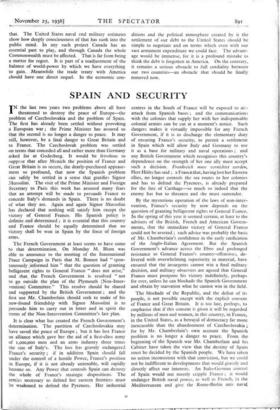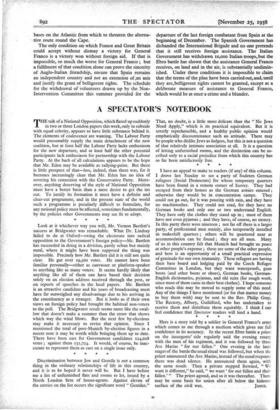SPAIN AND SECURITY I N the last two years two problems
above all have I threatened to destroy the peace of Europe—the problem of Czechoslovakia and the problem of Spain. The first has already been settled without provoking a European war ; the Prime Minister has assured us that the second is no longer a danger to peace. It may still, hoWever, be a fatal danger to Great Britain and to France. The Czechoslovak problem was settled on terms that conceded all and rather more than Germany asked for at Godesberg. It would be frivolous to suppose that after Munich the position of France and Great Britain is so secure, the dearly-purchased appease- ment so profound, that now the Spanish problem can ' safely be settled in a sense that gratifies Signor Mussolini. The visit of the Prime Minister and Foreign Secretary to Paris this week has aroused many fears that an attempt will be made to persuade France to concede Italy's demands in Spain. There is no doubt of what they are. Again and again Signor Mussolini has declared that nothing will satisfy him except the victory of General Franco. His Spanish policy is definite and determined ; it is essential that this country and France should be equally determined that no victory shall be won in Spain by the force of foreign arms.
The French Government at least seems to have come to that determination. On Monday M. Blum was able to announce to the meeting of the International Peace Campaign in Paris that M. Bonnet had " spon- taneously ,informed him " that the question of granting belligerent rights to General Franco " does not arise," and that the French Government is resolved " not to go outside the plan of the Plymouth (Non-Inter- vention) Committee." This resolve should be shared and supported by the British Government ; and the first use Mr. Chamberlain should seek to make of his new-found friendship with Signor Mussolini is to persuade him to carry out in letter and in spirit the terms of the Non-Intervention Committee's last plan.
It is clear what has created the French Government's determination. The partition of Czechoslovakia may have saved the peace of Europe.; but it has lost France an alliance which gave her the aid of a first-class army of t,000,000 men and an arms industry three times the size of Italy's. The loss has gravely endangered France's security ; if in addition Spain should fall under the control of a hostile Power, France's position in Europe, if it is not already untenable, will rapidly become. so. Any Power that controls Spain can destroy the whole of France's strategic dispositions. The armies necessary to. defend her eastern frontiers must be weakened to defend the Pyrenees. Her industrial centres in the South of France will be exposed to air- attack from Spanish bases ; and the communications with the colonies that supply her with her indispensable colonial armies can be cut at a moment's notice. Such dangers makes it virtually impossible for any French Government, if it is to discharge the elementary duty of ensuring France's security, to permit a settlement in Spain which will allow Italy and Germany to use it as a base for military and naval operations ; and any British Government which recognises this country's dependence on the strength of her one ally must accept such a decision. Frankreich muss vernichtet werden, Herr Hitler has said ; a Francethat, having lost her Eastern allies, no longer controls the sea routes to her colonies and has to defend the Pyrenees, is already prepared for the fate of Carthage—so much so indeed that the enemy has but to threaten and she must surrender.
By the mysterious operation of the laws of non-inter- vention, France's security by now depends on the question of granting belligerent rights to General Franco. In the spring of this year it seemed certain, at least to the advisers of the British, French and American Govern- ments, that the immediate victory of General Franco could not be averted ; such advice was probably the basis of Mr. Chamberlain's confidence in the early ratification of the Anglo-Italian Agreement. But the Spanish Government's advance across the Ebro and prolonged resistance to General Franco's counter-offensives, de- livered with overwhelming superiority in material, have ensured that the insurgents cannot win a final military decision, and military observers are agreed that General Franco must postpone his victory indefinitely, perhaps for ever, unless he can blockade the Spanish Government and obtain by starvation what he cannot win in the field.
The blockade of the Republic, and the defeat of its people, is not possible except with the explicit consent of France and Great Britain. It is too late, perhaps, to emphasise that if this consent is given it will be regarded by millions of men and women, in this country, in France, in the United States, as a betrayal of democracy far more inexcusable than the abandonment of Czechoslovakia; for by Mr. Chamberlain's own account the Spanish problem is no longer a danger to peace. From the beginning of the Spanish war Mr. Chamberlain and his Cabinet have taken the view that the destiny of Spain must be decided by the Spanish people. We have taken no action inconsistent with that conviction, but we could not be indifferent to developments that would gravely and directly affect our interests. An Italo-German control of Spain would not merely cripple France ; it would endanger British naval power, as well as French, in the Mediterranean and give the Rome-Berlin axis naval bases on the Atlantic from which to threaten the alterna- tive route round the Cape.
The only condition on which France and Great Britain could accept without dismay a victory for General Franco is a victory won without foreign aid. If that is impossible, so much the worse for General Franco ; but a fulfilment of that condition alone can prove the sincerity of Anglo-Italian friendship, ensure that Spain remains an independent country and not an extension ofan axis and justify the grant of belligerent rights. The schedule for the withdrawal of volunteers drawn up by the Non- Intervention Committee this summer provided for the departure of the last foreign combatant from Spain at the beginning of December. The Spanish Government has disbanded the International Brigade and no one pretends that it still receives foreign assistance. The Italian Government has withdrawn io,000 Italian troops, but the Ebro battle has shown that the assistance General Franco receives, on land and in the air, is substantially undimin- ished. Under these conditions it is impossible to claim that the terms of the plan have been carried out, and, until they are, belligerent rights cannot be granted, except as a deliberate measure of assistance to General Franco, which would be at once a crime and a blunder.















































 Previous page
Previous page